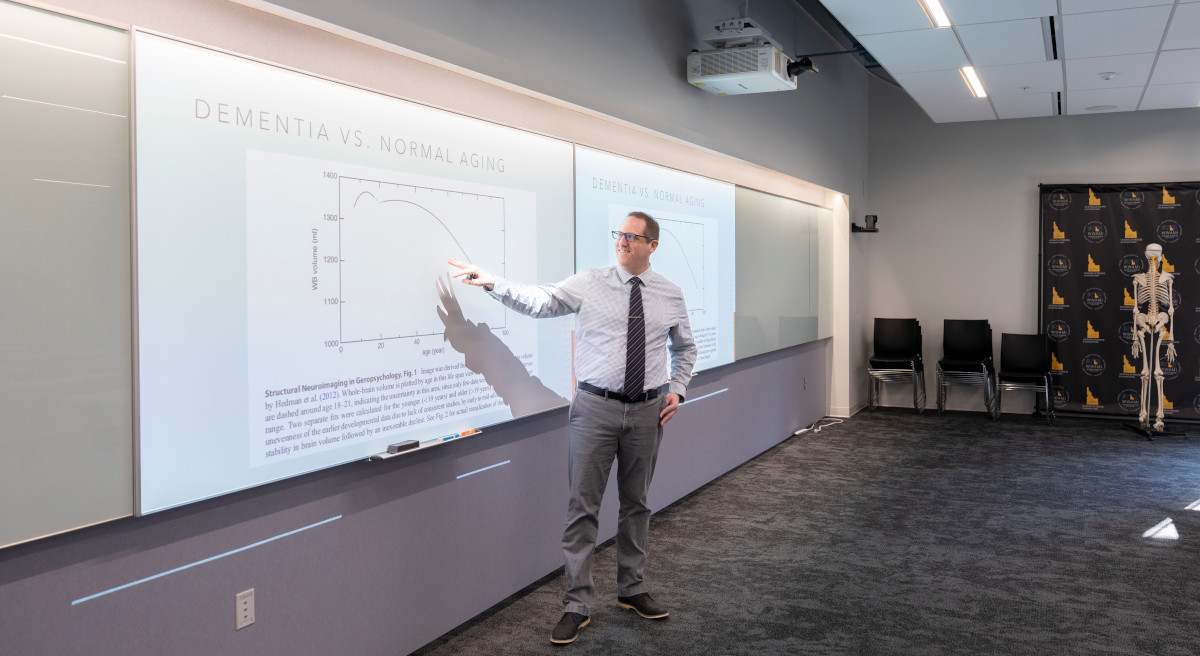Closing Idaho’s mental health gap and supporting rural health care
Building a pipeline for rural mental health care providers
Psychologists are few and far between in Idaho. All 44 of Idaho’s counties are considered Health Professional Shortage Areas for mental health, suffering from a lack of counselors, therapists and assessment professionals.
To train these professionals, University of Idaho established a Doctor of Clinical Psychology (Psy.D.) program, making it easier for people in the state and its rural areas to become psychologists by providing clinical psychology education in North Idaho.
We need psychologists who are ready to start thinking outside of the box, outside of the traditional urban environment. We need to start taking a more complex look at rural life versus urban life. Keith Hansen, director CMHC
“We need more psychologists in the state, and that means we need more pipelines,” said Thomas Farrer, director of clinical training for the Psy.D. program. “Psychology is one of the most popular majors at every school in Idaho. We have plenty of interested students, but they’ve had to leave Idaho to do their training because there weren’t enough training programs.”

Psychology is U of I’s largest undergraduate major, with approximately 500 students in the program at any time. In 2023, 777 students across Idaho graduated with an undergraduate psychology degree.
A traditional undergraduate psychology degree teaches students the basics of mental health conditions, human development and research methods. A Psy.D. is a professional graduate-level training program that dives deep into human behavior, psychological assessment and psychotherapy, preparing graduates for a career in clinical psychology.
Before the establishment of U of I’s Psy.D., there were only two options for clinical psychology training in Idaho: a Psy.D. program through Northwest Nazarene University (NNU) and a Ph.D. in clinical psychology at Idaho State University (ISU).

NNU and ISU are in Nampa and Pocatello respectively, forcing students from North Idaho to travel long distances if they wanted to attend school in-state.
“Rural students have had to go so far away to find clinical programs, since most are in urban areas,” said Keith Hansen, director of U of I’s Counseling and Mental Health Center. “Now that we can develop more psychologists in Idaho, we’ll get more providers in Idaho."
The ‘Swiss Army knife’ of mental health services
Psychologists and psychiatrists are two sides of the same coin; each field has its distinct function despite being closely related.

Clinical psychologists are doctoral-level providers, focusing on therapy, counseling and psychological assessments. Comparatively, psychiatrists are physicians who specialize in diagnosing mental illnesses, developing medication-based treatment plans and leading medical interventions for treatment-resistant mental disorders.
Psychologists have the widest scope of practice in mental health. They can do any mental health service in settings from hospitals to prisons to university counseling centers. And in Idaho, they can even prescribe medications by earning an additional master’s degree in psychopharmacology.
“They really are like the Swiss Army knife of mental health services, and we need far more of them in the state,” Farrer said.

Focusing on rural care
Rural communities traditionally have fewer mental health resources than their urban counterparts, but they also tend to have a different mentality when it comes to mental health care.
Hansen, who lived in rural Maine before coming to Idaho, said that it is common to discuss mental health in urban areas but in rural communities, people tend not to be as open about it, considering mental health care a “luxury item.”
He said that medical and mental health research is usually conducted in urban areas, which creates a challenge because the findings don't always apply to rural communities.
“I was in a training about substance abuse and someone asked a question about opiate use and how it should be approached. The provider leading the session mentioned needle exchange programs. I was like, ‘No, no, no, that’s for an urban area. Out here it’s pills that affect us, we need a different strategy,’” he said.
In 2023, roughly 18% of Idaho adults reported misusing prescription drugs in the last 12 months. And in 2022, there were 381 total deaths due to drug overdose, 270 of which were opioid related.

“We need psychologists who are ready to start thinking outside of the box, outside of the traditional urban environment,” Hansen said. “We need to start taking a more complex look at rural life versus urban life.”
The Psy.D. program will help close the gap. Students will be able to work with the Idaho Office of Underserved and Rural Medical Research to complete research projects related to mental health in rural Idaho communities, and they will have the opportunity to practice psychology in rural communities throughout their education.
A ‘win for Idaho’
Farrer stated that the program's impact will be felt almost immediately, as students will swiftly move into North Idaho communities to start their training.
“If I’m the sole provider at a private practice in Moscow, I can only see so many patients, but if I have a trainee, then I can increase the number of patients that I'm seeing, which is good for the consumer because now there’s more providers,” he said.
Thomas J. Farrer, PhD, ABPP
Assistant Professor, Associate Program Director
As students connect with clinics, hospitals and individual providers to train under the supervision of a licensed psychologist, they will become immersed in Idaho’s communities, learning the ins and outs of the local mentality and care system.
“Establishing the Psy.D. is such a win for Idaho,” Farrer said. “We don’t have enough mental health care providers in the state. This degree will be a pipeline for more professionals to be trained in Idaho, for Idaho.”
Upon graduation, students can sit for the Examination for Professional Practice in Psychology. After passing the exam, they will be licensed clinical psychologists.
The Psy.D. will be a collaborative effort between the School of Health and Medical Professions, the Psychology and Communication Department and the Counseling and Mental Health Center. The degree will take five years to complete and will begin Fall 2026.
Keith Hansen, Psy.D.
Interim Director













